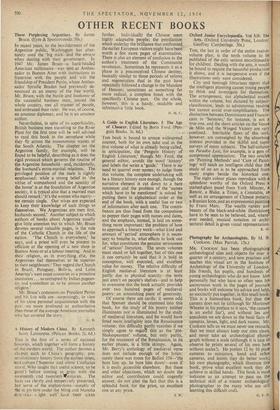THIS book is bound to arouse widespread interest, both for
its own Sake and as the first volume of what is already being called, in anticipation, the 'Penguin History of English Literature,' though Mr.. Ford, the general editor, avoids the word 'history' and labels the series a 'guide.' 'There is no need to quarrel over names; to judge from this volume, the complete undertaking will be a literary history sure enotigh, though the narrative element is cut down to a bare minimum and the problem of the 'names which have to be mentioned' is solved by putting them in alphabetical order at the end of the book, with k useful line or two of information after each one. The contri- butors are thus freed from the compulsion to pepper their pages with names and dates, and the emphasis, instead, is laid on some- thing more important: the problem of how to approach a literary work—what kind and amount of 'period' atmosphere it is neces- sary to breathe in, what effects to look out for, what constitutes the genuine seriousness of 'serious' literature. The seven volumes must stand or fall together, but of this one it can certainly be said that it is bold in conception, well executed, and excellent value for money. The relative difficulty of English medieval literature is at least partly due to physical scarcity—the texts just aren't on people's shelves—and to help to overcome this the book actually provides over two hundred pages of medkeval poetry : an astonishing piece of generosity. Of course there are cavils: it seems odd that Spenser should be crammed into this book, for the study of his poetry neither illuminates nor is illuminated by the study of medieval literature, and -he would have fitted more intelligibly into the Renaissance volume; this difficulty partly vanishes if we simply agree to regard this as the 'pre- Shakespearean' volume, but only partly, for the treatment of the Renaissance, in its earlier phases, is a little skimpy. Again, Mr. Berry's anthology of medimval verse does not include enough of the lyrics: surely there was room for Balliol 354—'He bare him up, he bare him down'—even if it is easily ..accessible elsewhere. But these and other objections, which no doubt the editor and contributors could cogently answer, do not alter the fact that this is a splendid book for the price, an , excellent one at any price.


































 Previous page
Previous page